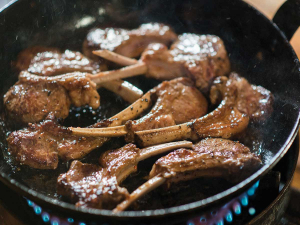2024-25 season shaping up to be 'a cracker'
ANZ agricultural economist Susan Kilsby is describing the 2024-25 dairy season as ‘a cracker’.
 eef and lamb prices have been hit particularly hard by the pandemic given many cuts of meat – particularly for lamb – are consumed in restaurants. Photo credit: Kieren Scott - Minaret Station
eef and lamb prices have been hit particularly hard by the pandemic given many cuts of meat – particularly for lamb – are consumed in restaurants. Photo credit: Kieren Scott - Minaret Station
Farmgate red meat prices are taking a hit as Covid continues to disrupt dining out businesses around the world.
Beef prices are down 16% on a year ago, lamb prices down around 18% in New Zealand dollar terms.
ASB economist Nat Keall says it’s a more muted start to the year for beef and lamb prices when compared to
dairy.
Keall notes that lamb prices in particular aren’t too far above the lows seen in the immediate post-pandemic churn.
By contrast, ASB’s dairy indices are only down about 8% in NZ dollar terms, a reflection of the 9% lift in the currency over the year. Forestry and fruit indices are actually running ahead of this time last year in NZ dollar terms and are up strongly in US dollar terms.
Keall says two downside factors in particular are weighing on the meat sector: the global pandemic and tentative signs the world is emerging from the global protein shortage of recent years.
“Beef and lamb prices have been hit particularly hard by the pandemic given many cuts of meat – particularly for lamb – are consumed in restaurants, hitting demand and limiting the mark-up sellers can charge,” he told Rural News.
“While the global vaccine rollout is tentatively underway, restrictions crimping the food service sector remain in place in
many parts of the world.”
And there is little light at the end of the tunnel as market and logistical risks remain in play.
ANZ agriculture economist Susan Kilsby expects farmgate prices for lamb and beef to soften further as we head into the peak processing months.
“Winter returns were lower than normal, but aligned with our previous expectations, as lockdowns limited demand for dining out opportunities,” Kilsby says.
China remains a bright spot as its economy is recovering quicker than other parts of the world.
But Kilsby warns that further lockdowns remain the key risk.
A lack of cool store capacity and disruption to shipping could cause processing delays later in the season.
Meat prices also look set to lose a key support too as the Chinese pig herd continues to rebuild after being thinned out by African Swine Fever (ASF).
ASB’s Nat Keall says the global protein shortage triggered by ASF has been a much-needed price support over recent years, partially offsetting the impact of Covid.
“At times, ASF has shrunk the Chinese pig herd by as much as 40%, forcing consumers to substitute pork for other types of meat. For now, prices remain historically high.
“However, the latest data shows China’s pig herd back at 90% of normal levels as of the end of November 2020, suggesting things could start to ease a little as time goes on.”
Fonterra's plan to expand its organic programme to the South Island is being well received by farmers, the co-op says.
Voting has started for the renewal of DairyNZ's milksolids levy.
The most successful catchment groups in NZ are those that have 'a source to sea' approach.
Associate Agriculture Minister and Manawatu dairy farmer Andrew Hoggard says the free trade agreement (FTA) negotiated with India is not a bad deal and his party, Act, will support it when it goes before Parliament.
Newly released data from Environment Canterbury (ECan) Farm Environment Plan (FEP) audits are showing a dramatic lift in environmental performance across the region.
A solid recovery of global dairy prices this year makes a $9.50/kgMS milk price almost a shoo-in for this season.

OPINION: Here w go: the election date is set for November 7 and the politicians are out of the gate…
OPINION: ECan data was released a few days ago showing Canterbury farmers have made “giant strides on environmental performance”.